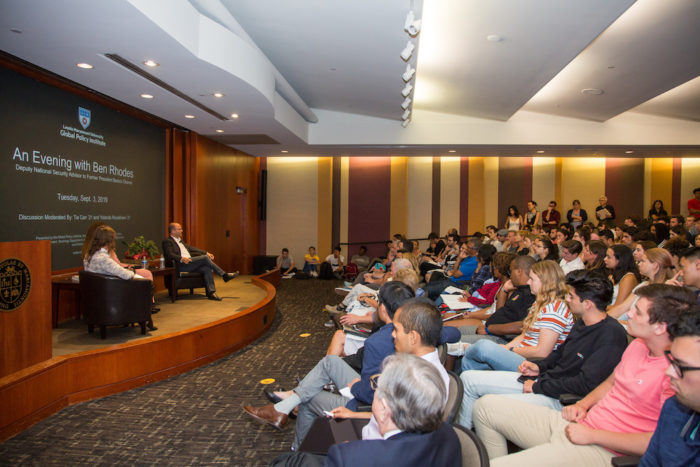
Ben Rhodes, former Deputy National Security Advisor to President Barack Obama, visited Loyola Marymount University on September 3, 2019 to discuss his New York Times bestselling book, “The World As It Is.” In front of a packed auditorium of more than 200 attendees, Rhodes reminisced about his time in the White House, shared insights on current world affairs, and spoke of a future he believes students can help create.
A native New Yorker, Rhodes has a B.A. from Rice University and an M.F.A from New York University. He joined Obama’s presidential campaign in 2007, and played an important role in Obama’s Administration. He participated in key decisions, and oversaw national security communications, speechwriting, public diplomacy and global engagement programs. He also led the secret negotiations with the Cuban government to normalize relations between the United States and Cuba, and supported negotiations to conclude the Joint Comprehensive Plan of Action (JCPOA) with Iran. Prior to joining the Administration, he was a senior speechwriter and foreign policy advisor to the Obama campaign. From 2002-2007, he worked for former Congressman Lee Hamilton, supporting his work on the 9/11 Commission and Iraq Study Group.
Student moderators Tia Carr ’21 and Yolanda Nosakhare ‘21, both international relations majors, opened the conversation by asking Rhodes how his journey into politics began. Rhodes was finishing up a master’s degree in fiction writing when the events of 9/11 compelled him to turn his interest towards politics. Rhodes was able to put his writing and liberal arts background to use as a speechwriter harnessing the power of narrative to inspire feelings of hope and optimism about the future of our country. In the spirit of LMU’s roots in the liberal arts, Rhodes also stressed the importance of understanding the historical and cultural influences that shape politics and policy.
The student moderators did not shy away from asking challenging questions about controversial issues, and in return received nuanced and candid responses from Rhodes. Carr went into the event excited to “dive deep into the nitty gritty of important policy decisions,” while avoiding topics that had already been discussed in Rhodes’ book or other interviews. Although some attendees may have been surprised by Rhodes’ openness, the moderators designed their questions with that in mind. In listening to his frequent appearances on “Pod Save the World” and reading his tweets, the two realized that Rhodes “was unconcerned with maintaining a high level of censorship,” and attributed his genuine candor to his decision not to run for office or seek another White House staff position.
In many aspects, Rhodes was very complimentary of the Obama administration, and praised President Obama for embracing his role as the first black president. Rhodes fondly recalled that on one occasion, President Obama visited the Afro-Brazilian slum of Favela in Rio, a place where Brazilian politicians never go, and kicked a soccer ball around with local kids as residents lined the streets to look at him. Rhodes also praised the administration’s efforts to make climate change an integral part of its foreign policy objectives, and develop a bilateral infrastructure ideal for US-China relations.
While he found much to praise in the Obama administration, Rhodes also offered some frank criticisms. When asked about the effectiveness of military intervention on humanitarian grounds, Rhodes admitted to a deep skepticism. Although the military can destroy things, “it can’t really build things up.” Rhodes also addressed the controversial use of drone strikes in the Obama administration, voicing his concern that the ease of ordering a strike led to an overuse against targets that would not have otherwise been a priority.
Unsurprisingly, Rhodes condemned the global rise of nationalism. With his expertise in foreign policy, Rhodes specifically addressed the damage President Trump has caused by pulling out of the Paris Climate Accords, engaging in a unilateral trade war with China, and alienating our allies (he wryly compared the election of Trump with a neighbor hosting their drunk and obnoxious uncle). Most importantly, Rhodes lamented Trump’s effect on the world’s confidence in democracy. According to Rhodes, countries already skeptical of democracy point to the fact that the American political system—an example of democratic success—can result in the election of a controversial President like Trump.
In spite of the dire situation he sees the country currently in, Rhodes ended the night by expressing hope for our future. Trump’s election has “erased the blackboard” and redefined what is politically possible. While many candidates appeal to “electability,” the election of Trump proves that Americans are not afraid of nonconventional approaches.
Rhodes concluded, “I worked on two winning presidential campaigns for a black guy named Barack Hussein Obama—from Hawaii.” Voters want authenticity, and will take a risk on a candidate who really believes in something and makes an impassioned argument.
With the help of moderators Tia Carr and Yolanda Nosakhare, Rhodes filled the evening with anecdotes and criticisms, warnings and messages of hope. Carr reflected, “I hope students were empowered by seeing someone who was initially only equipped with a passion for change go on to be so incredibly successful.”
Reporting by Taylor Dischinger, a freshman English major



